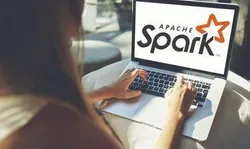
Big Data Computing with Spark 
This course provides an introduction to Big Data Computing with Spark. It covers the fundamentals of Hadoop and Spark, as well as how to use cloud computing platforms to access these technologies. Students will learn how to manage large amounts of data across multiple nodes, and gain an understanding of the tools and techniques used to process and analyze big data. ▼
ADVERTISEMENT
Course Feature
![]() Cost:
Cost:
Free
![]() Provider:
Provider:
Edx
![]() Certificate:
Certificate:
Paid Certification
![]() Language:
Language:
English
![]() Start Date:
Start Date:
Self paced
Course Overview
❗The content presented here is sourced directly from Edx platform. For comprehensive course details, including enrollment information, simply click on the 'Go to class' link on our website.
Updated in [March 06th, 2023]
Learners can learn the fundamentals of big data systems and cloud computing platforms from this course. They will gain an understanding of the architecture of big data systems, such as Hadoop and Spark, and how they are used to manage massive amounts of data. They will also learn how to use Spark to process and analyze data, and how to deploy Spark applications on cloud computing platforms. In addition, learners will gain practical skills in coding with Spark, as well as the ability to design and implement big data applications. Finally, learners will be able to apply their knowledge to real-world scenarios, such as data mining, machine learning, and natural language processing.
[Applications]
The application of this course can be seen in various areas such as data engineering, data science, and machine learning. Learners can use the knowledge and skills acquired from this course to develop and deploy big data applications on Spark. They can also use the course to gain a better understanding of the underlying architecture of Spark and its components, and apply this knowledge to optimize the performance of their applications. Furthermore, learners can use the course to gain an understanding of the various tools and techniques available for data analysis and machine learning on Spark.
[Career Paths]
1. Big Data Engineer: Big Data Engineers are responsible for designing, developing, and maintaining big data solutions. They are responsible for creating and managing data pipelines, developing data models, and optimizing data storage and retrieval. They must be knowledgeable in the latest big data technologies, such as Hadoop, Spark, and NoSQL databases. As the demand for big data solutions continues to grow, Big Data Engineers will be in high demand.
2. Data Scientist: Data Scientists are responsible for analyzing large datasets to uncover patterns and insights. They use a variety of techniques, such as machine learning, natural language processing, and statistical analysis, to extract meaningful information from data. As the amount of data continues to grow, the demand for Data Scientists will continue to increase.
3. Data Analyst: Data Analysts are responsible for analyzing data to identify trends and insights. They use a variety of techniques, such as data mining, statistical analysis, and predictive modeling, to uncover insights from data. As businesses continue to rely on data to make decisions, the demand for Data Analysts will continue to grow.
4. Cloud Computing Engineer: Cloud Computing Engineers are responsible for designing, developing, and maintaining cloud-based solutions. They must be knowledgeable in the latest cloud technologies, such as Amazon Web Services, Microsoft Azure, and Google Cloud Platform. As businesses continue to move to the cloud, the demand for Cloud Computing Engineers will continue to increase.
[Education Paths]
1. Bachelor of Science in Computer Science: This degree program provides students with a comprehensive understanding of computer science fundamentals, including programming, algorithms, data structures, operating systems, and computer architecture. It also covers the latest developments in big data computing, such as distributed computing, cloud computing, and data mining. Students will gain the skills to design, develop, and deploy big data applications using Spark.
2. Master of Science in Data Science: This degree program focuses on the application of data science techniques to solve real-world problems. It covers topics such as machine learning, data mining, natural language processing, and data visualization. Students will learn to use Spark to analyze large datasets and develop predictive models.
3. Master of Science in Artificial Intelligence: This degree program provides students with a comprehensive understanding of artificial intelligence (AI) and its applications. It covers topics such as machine learning, deep learning, natural language processing, and computer vision. Students will learn to use Spark to develop AI-based applications and systems.
4. Doctor of Philosophy in Big Data Computing: This degree program focuses on the research and development of big data computing technologies. It covers topics such as distributed computing, cloud computing, data mining, and machine learning. Students will gain the skills to design and develop advanced big data applications using Spark.
Course Provider

Provider Edx's Stats at AZClass
Discussion and Reviews
0.0 (Based on 0 reviews)
Explore Similar Online Courses

CBT for Depression Anxiety Phobias and Panic Attacks

World of Project Management

Python for Informatics: Exploring Information

Social Network Analysis

Introduction to Systematic Review and Meta-Analysis

The Analytics Edge

DCO042 - Python For Informatics

Causal Diagrams: Draw Your Assumptions Before Your Conclusions

Whole genome sequencing of bacterial genomes - tools and applications

Apache Spark Essential Training

Apache Spark 20 with Java -Learn Spark from a Big Data Guru

Taming Big Data with Apache Spark and Python - Hands On!
 Related Categories
Related Categories
 Popular Providers
Popular Providers
Quiz
 Submitted Sucessfully
Submitted Sucessfully
1. What is the main platform used in this course?
2. How many coding questions are included in this course?
3. What type of course is this?


Start your review of Big Data Computing with Spark